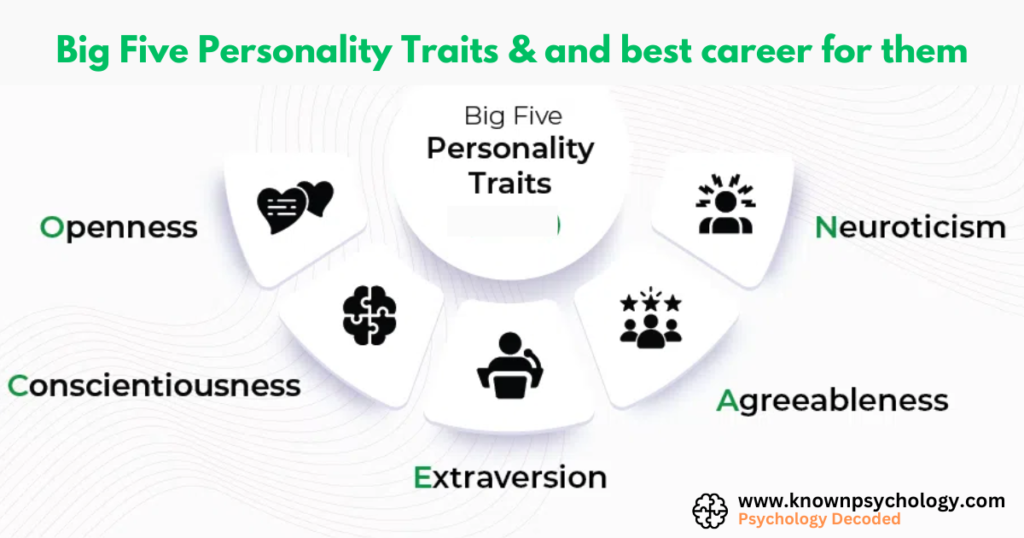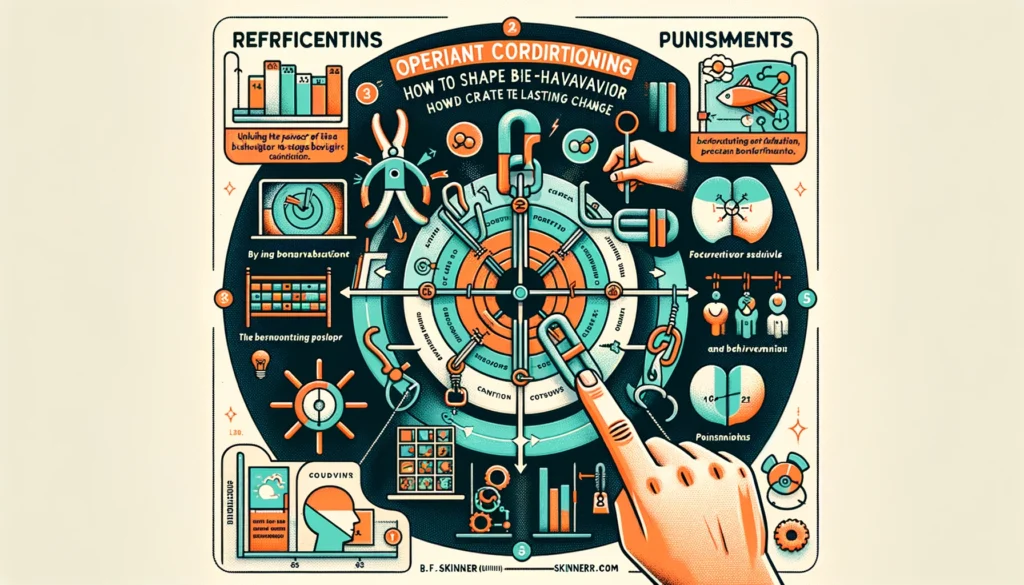
Understanding the Big Five Personality Traits can be a powerful tool in identifying a career that not only suits your skills but also aligns with your inherent characteristics. These traits—Openness, Conscientiousness, Extraversion, Agreeableness, and Neuroticism—form a widely recognized framework that psychologists use to describe human personality. By exploring how these traits relate to different job environments, you can make more informed decisions about your career path.
Big Five Personality Traits & and best career for them
1. Openness to Experience
Openness involves a person’s level of creativity and willingness to try new things. If you score high in openness, you might thrive in roles that require innovation, problem-solving, and a dynamic work environment.
Characteristics: Creative, imaginative, open to new experiences, curious.
Best Careers:
- Creative Fields: Artists, writers, designers, and musicians benefit from high openness, as these careers require innovation and originality.
- Science and Research: Researchers and scientists thrive in environments that demand curiosity and the exploration of new ideas.
- Education: Educators and trainers who are open to new teaching methods and ideas can engage more effectively with diverse learning styles.
2. Conscientiousness
Conscientiousness is characterized by being organized, dependable, and disciplined. Highly conscientious individuals often excel in roles that require attention to detail and a systematic approach to work.
Characteristics: Organized, dependable, detail-oriented, diligent.
Best Careers:
- Finance and Accounting: Accuracy and organization are critical in roles such as accountants, financial analysts, and auditors.
- Healthcare: Doctors, nurses, and healthcare administrators benefit from a conscientious approach to managing patient care and medical details.
- Management: Project managers, executives, and administrative professionals need high levels of conscientiousness to oversee operations and meet deadlines.
3. Extraversion
Extraversion indicates how outgoing and sociable a person is. Extraverts generally prefer jobs that involve interacting with other people, such as sales, teaching, or public relations.
Characteristics: Outgoing, sociable, energetic, enjoys interacting with others.
Best Careers:
- Sales and Marketing: These roles require engaging with clients and promoting products or services energetically.
- Public Relations and Event Planning: Managing public events and creating media relationships leverages an extravert’s natural social skills.
- Teaching and Public Speaking: Careers that involve speaking in front of groups or leading classes fit well with an extravert’s personality.
4. Agreeableness
Agreeableness reflects a person’s ability to get along with others. People who score high in this trait are often successful in collaborative and team-oriented environments.
Characteristics: Cooperative, sympathetic, caring, friendly.
Best Careers:
- Counseling and Social Work: These careers require a genuine concern for the welfare of others and the ability to work well in cooperative settings.
- Healthcare: Nursing, therapy, and patient advocacy are fields where agreeableness is a crucial asset.
- Human Resources: Managing workplace dynamics and supporting employees’ needs are well-suited tasks for agreeable personalities.
5. Neuroticism
Neuroticism measures emotional stability and the tendency to experience negative emotions. Those with lower scores in neuroticism, meaning they are more emotionally stable.
Characteristics: (Lower scores are typically seen as more desirable in most job settings) Calm, resilient, secure.
Best Careers:
- Emergency Services: High-stress situations are common in roles such as firefighters, police officers, and emergency medical technicians, where emotional stability is crucial.
- Senior Leadership: Executives and managers face high-pressure decisions and conflicts, requiring a stable and composed demeanor.
- Military: Positions within the armed forces demand discipline and the ability to remain calm under pressure.
How to Match Big Five Personality Traits with the Right Job
Understanding your dominant traits in the Big Five model can help guide your career choices, aligning your work environment with your personality for greater satisfaction and success. Here how to match Big Five Personality Traits with the right job.
Assessing Your Personality Traits
The first step in finding a job that fits your personality is to assess where you stand on each of the Big Five traits. Numerous online assessments can provide a detailed analysis of your personality profile. Understanding your scores can guide you toward careers that match your natural predispositions.
Aligning Your Traits with Career Paths
Once you know your Big Five Personality Traits scores, consider how these traits influence job satisfaction and performance. For instance, if you score high in conscientiousness and agreeableness, you might look for roles that require meticulousness and teamwork. Aligning your traits with the requirements of a job can lead to greater satisfaction and success.
Considering Work Environment and Company Culture
It’s not just the job role that matters but also the company’s culture and the work environment. A good match between your personality and the workplace can enhance job satisfaction. For example, a highly extraverted person might find a lively, interactive office more stimulating and rewarding than a quiet, isolated one.
Practical Tips for Applying Personality Insights to Your Career Search
Use Insights in Job Interviews
Understanding your Big Five Personality Traits can also help you during job interviews. You can articulate how your personality makes you a strong fit for the job and discuss how your traits will add value to the team and company.
Continuous Self-Improvement
Finally, while your personality traits can guide you to a suitable career, they are not fixed. Engaging in personal development activities can help you adapt and thrive in your chosen field, even if it’s not a perfect match initially.
A Note from Known_Psychology
By understanding the Big Five Personality Traits, you can approach your career search with greater insight and confidence. This knowledge not only helps you identify jobs where you’ll excel but also fosters a deeper understanding of how to develop your strengths further. In doing so, you can maximize your professional potential and achieve greater fulfillment in your work life.
References
Costa, P. T., & McCrae, R. R. (1992). Revised NEO Personality Inventory (NEO-PI-R) and NEO Five-Factor Inventory (NEO-FFI) professional manual. Odessa, FL: Psychological Assessment Resources.
Mariam holds an MS in Sociology with a specialization in Medical Sociology and Social Psychology. With a strong academic background and extensive research work in both fields, she brings depth and clarity to complex topics. Her writing explores the intersection of society, health, and the human mind, making academic ideas easy to grasp and relevant to everyday life.


